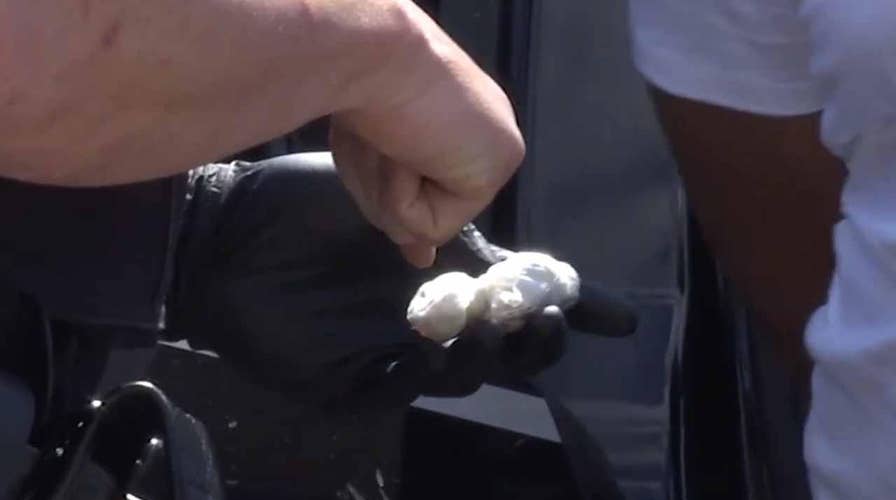First responders on the frontline fighting opioid crisis
East Liverpool, Ohio police department is developing strategies to deal with the epidemic hurting the region
Ohio police officers are taking added precautions while on patrol as they try to save others overdosing on opioids.
East Liverpool Officer Chris Green almost died on the job last month after accidentally overdosing on fentanyl because of exposure on the job. Green told Fox News he noticed drugs in a suspect’s vehicle during a routine traffic stop then took the necessary precautions when directly dealing with the substance.
A colleague back at the police station later pointed out powdery particles on Green’s shirt. Green wiped it off, then he collapsed.
He was briefly hospitalized and treated before being released.
1-YEAR-OLD REVIVED WITH NARCAN AFTER OPIOID OVERDOSE, POLICE SAY
Green is not the only one. Many police officers are interacting with opioids like fentanyl more today than they did years ago, and despite precautions taken, their exposure while on the job can result in accidental overdoses.
Ohio led the nation in opioid overdose deaths in 2015, according to the Kaiser Family Foundation.
Soon after Green’s overdose, a Maryland sheriff’s office corporal overdosed after searching a drawer at an overdose call and another Ohio officer said he felt light-headed after touching what police believe was fentanyl.
It is possible to overdose on opioids like fentanyl by simply touching the drug, or by accidentally taking in particles that are nearly impossible to see, Michael Lynch, medicial director of Pittsburgh Poison Center, told Fox News.
"Any situation where the drug would...come into contact with your mouth, nose or eye mucosa would be a situation where you might be concerned about exposure,” Lynch said, adding that it is not common.
DAD OVERDOSES ON HEROIN TO TEACH HIS ADDICT SON A LESSON
Green believes his overdose may have come from infiltration of the drug into his skin, noting that he had just removed his gloves and his hands were sweaty. Lynch told Fox News that it’s possible.
“Officers or first responders potentially could be in situations where they’re sweating where...it is possible to absorb more of the fentanyl as it is sort of dissolved in the sweat and exposed to skin that becomes more permeable,” Lynch said.
Green said he felt alert after receiving four doses of Narcan.
Lynch thinks it may be harder to revive officers from an overdose in the future as drugs like fentanyl and carfentanil become stronger.
"We’re hearing anecdotal reports of larger and larger amounts of Narcan being needed to reverse it.” Lynch told Fox News.
And while there is no clear indication of a future solution for this opioid overdose epidemic, Green said he fears for his colleagues.
“I pray every day that I’m the last one,” he said. “There’s no way that I’m the last one.”

